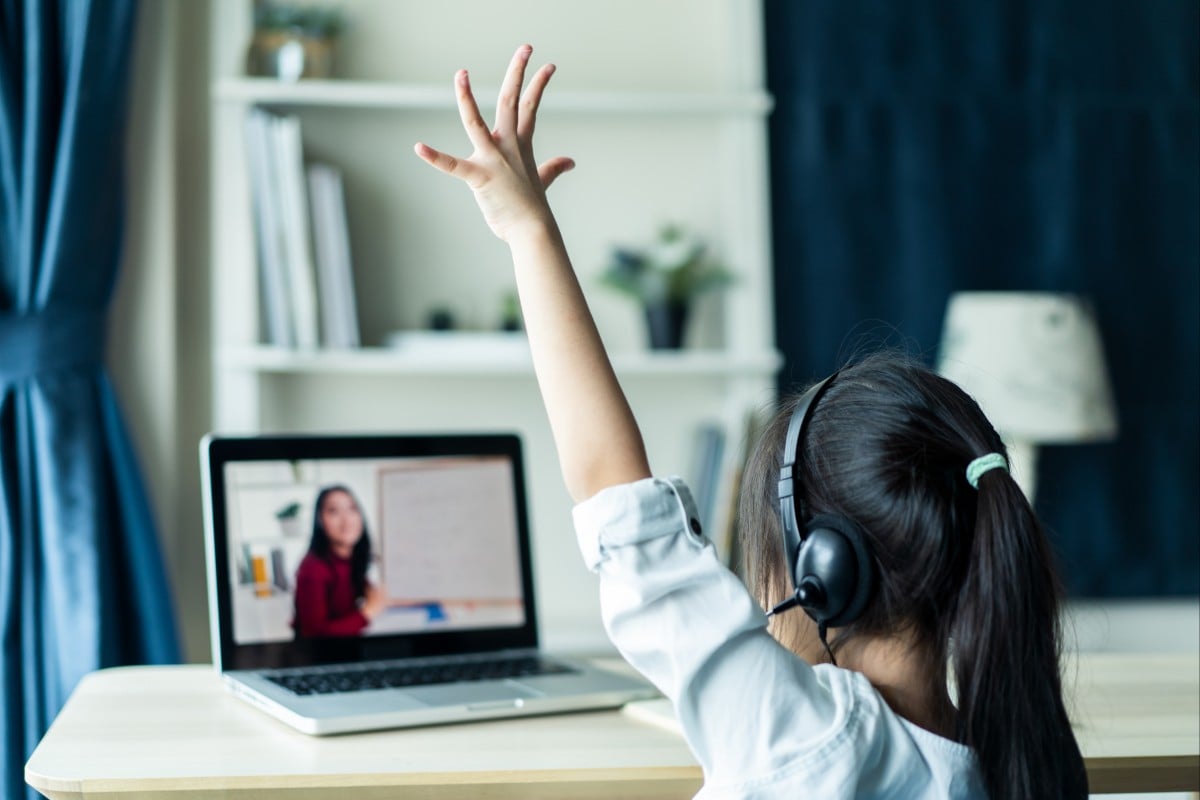
Face Off: Should Hong Kong schools continue virtual lessons during weather-related school closures?
Each week, two readers discuss a hot topic in a parliamentary-style debate that doesn’t necessarily reflect their personal viewpoints.
 Do virtual classrooms really help learning progress at home? Photo: Shutterstock
Do virtual classrooms really help learning progress at home? Photo: ShutterstockIf you are interested in joining future Face Off debates, fill out this form to submit your application.
For: Hayden Chan, 16, Ying Wa College
Hong Kong should continue virtual lessons in the case of weather-related school closures.
The remnants of the pandemic have loomed over Hong Kong for the past four years, a time when people wore face masks and socially distanced themselves. When Covid cases were at their peak, pupils could not go to school, and teachers would use video conferencing software like Zoom or Webex to continue classes.
Utilising these applications when in-person gatherings are not possible allows students to continue to learn interactively and collaboratively. For instance, they can ask questions using a chat box and draw and scribble ideas on a digital whiteboard.
Therefore, virtual lessons are undoubtedly a convenient substitution for face-to-face lessons in case of school closures. Imagine raindrops lashing your window panes and the wind screeching outside; in this situation, you are not likely to be hanging out with friends. Most Hong Kong students probably prefer playing video games and doomscrolling through social media posts instead of studying at home.
However, a weather-related closure should not mean a hiatus from your studies. Continuing lessons virtually ensures your studying progresses without wasting time. There is no reason we should cancel classes and encourage students to lie in bed all day.
Furthermore, just one day of school suspension means a tighter work schedule for the rest of the week. If the weather stops teachers from physically reaching school, they cannot mark assignments and their workloads are doubled the following day, placing a heavy burden on them.
Students missing a day of school also have to catch up, creating even more academic stress for them. One day being off from school is not worth the extra effort and time it takes later to pick your studying back up.
Online learning platforms are easy to manage. Students only need to click a meeting link and enter a passcode to join a virtual classroom, just a few minutes before the lesson starts. Morning breaks and lunch are perfect time slots for students to rest their eyes.
With such sophisticated technology available to us, we should use it properly. The problem of virtual lessons during weather-related closures has no place for controversies; student learning cannot be sacrificed.
Should schools shrink class sizes to improve student mental health?
Against: Cadence Kwok, 18, Marymount Secondary School
As video conferencing platforms like Zoom become more popular, virtual lessons have become the go-to for schools to squeeze in extra teaching hours amid incessant thunderstorms.
But do online lessons really make a difference in learning progress?
During the pandemic’s peak, many local students would play video games or chat casually with friends on their phones as teachers droned on in the background.
Some even remained in their pyjamas, snuggled up in cosy bedsheets before inevitably dozing off.
With enticing distractions embedded in every corner and a comfortable ambience, you’d find it difficult to resist the burning urge to lose focus. How can constructive learning be facilitated when students are in a home environment – the opposite of school?
Will students pay attention when they aren’t in the physical presence of teachers monitoring their learning?
The issue is further exacerbated by the availability of the “turn off your camera” function, enabling students to get off scot-free. It’s doubtful whether online lessons are truly as beneficial to one’s studies as they are made out to be.
Assigning tasks to students is a preferred alternative. Easily accessible learning platforms like Google Classroom allow teachers to simultaneously make announcements and delegate homework to a group.
Students can then pick up their studies free from the hindrance of adverse weather. It’s a practical way out for schools looking to implement at-home learning that benefits students’ academics.
It also requires less effort from teachers busy catching up on more urgent school duties during their unexpected day off.
This solution allows for greater flexibility. Typhoons and rainstorms occur frequently in Hong Kong, with the former happening nine times yearly on average.
Some homes may unluckily be affected by problems like water leaks in need of urgent cleaning up. Without online full-day classes, students and teachers alike can resolve unanticipated issues as they happen instead of having to stay glued to their seats. Local weather-related school suspensions usually don’t last more than a day or two.
With minimal time away from school, the negative impact on students learning is negligible. Therefore, virtual lessons are ineffective and unproductive, as there are more ideal options available.
